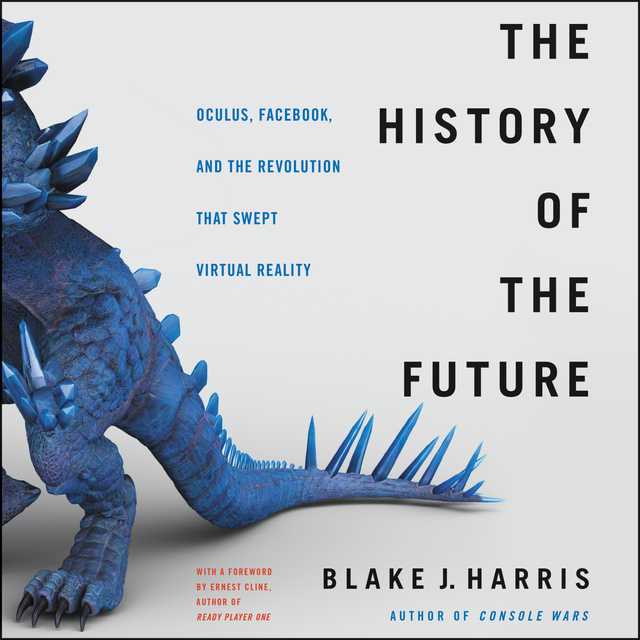The History of the Future Audiobook Summary
The dramatic, larger-than-life true story behind the founding of Oculus and its quest for virtual reality, by the bestselling author of Console Wars.
From iconic books like Neuromancer to blockbuster films like The Matrix, virtual reality has long been hailed as the ultimate technology. But outside of a few research labs and military training facilities, this tantalizing vision of the future was nothing but science fiction. Until 2012, when Oculus founder Palmer Luckey–then just a rebellious teenage dreamer living alone in a camper trailer–invents a device that has the potential to change everything.
With the help of a videogame legend, a serial entrepreneur and many other colorful characters, Luckey’s scrappy startup kickstarts a revolution and sets out to bring VR to the masses. As with most underdog stories, things don’t quite go according to plan. But what happens next turns out to be the ultimate entrepreneurial journey: a tale of battles won and lost, lessons learned and neverending twists and turns–including an unlikely multi-billion-dollar acquisition by Facebook’s Mark Zuckerberg, which shakes up the landscape in Silicon Valley and gives Oculus the chance to forever change our reality.
Drawing on over a hundred interviews with the key players driving this revolution, The History of the Future weaves together a rich, cinematic narrative that captures the breakthroughs, breakdowns and human drama of trying to change the world. The result is a super accessible and supremely entertaining look at the birth of a game-changing new industry.
Supplemental enhancement PDF accompanies the audiobook.
Other Top Audiobooks
The History of the Future Audiobook Narrator
Stephen Graybill is the narrator of The History of the Future audiobook that was written by Blake J. Harris
Blake J. Harris is the bestselling author of History of the Future and Console Wars, which is now a CBS All Access feature film by Seth Rogen and Evan Goldberg. He has written for ESPN, IGN, Fast Company, The Huffington Post, /Film and The AV Club. He is also a regular guest on Paul Scheer’s How Did This Get Made? podcast, where every week he interviews some the biggest names responsible for some of the worst movies ever made. Harris lives in New York with his wife.
About the Author(s) of The History of the Future
Blake J. Harris is the author of The History of the Future
More From the Same
- Author : Blake J. Harris
- Console Wars
- Publisher : HarperAudio
- Abraham
- American Gods [TV Tie-In]
- Dead Ringer
- House of Sand and Fog
- Prey
The History of the Future Full Details
| Narrator | Stephen Graybill |
| Length | 17 hours 38 minutes |
| Author | Blake J. Harris |
| Category | |
| Publisher | HarperAudio |
| Release date | February 19, 2019 |
| ISBN | 9780062695307 |
Subjects
The publisher of the The History of the Future is HarperAudio. includes the following subjects: The BISAC Subject Code is Social Aspects, Technology & Engineering
Additional info
The publisher of the The History of the Future is HarperAudio. The imprint is HarperAudio. It is supplied by HarperAudio. The ISBN-13 is 9780062695307.
Global Availability
This book is only available in the United States.
Goodreads Reviews
Hari
March 10, 2019
It is easy to say that one should never be penalized professionally for their personal views. But what if they were the face of a company and had a view that was unpopular with the MSM resulting in their perhaps unfair vilification of the founder and by association the company?Blake Harris does a commendable job taking us through the story of Oculus founder Palmer Luckey's journey right from his days of dreaming up Oculus right behind his childhood home to his Jobs-esque ouster following its Facebook acquisition. While Harris risks, at times, being an apologist for Luckey through this book he does manage to do this without alienating his audience. Worthy read for anyone who has been interested in VR.
Michael
May 02, 2019
THIS BOOK WAS GREAT!
Raymond
March 17, 2019
Couldnt put it down!I was an original backer of the Oculus Kickstarter. I remember many of the moments in this book. It's incredible getting to go back and get so much more detail and context from these moments in history. Blake does an absolutely amazing job of presenting an objective and honest recounting of everything that happened.Thank you for making this amazing piece of work!Palmer Lucky, I am sorry you were so wrongfully pushed out of your dream. I still use my Rift every week and I can never thank you enough for making something that inspired so many talented people to come together and make something truly amazing!
Kai
May 13, 2019
** spoiler alert ** Best book this year ! Alot of insider information. Would have hoped for a look into the future.
Doc
December 01, 2019
What a crazy ride! Interesting story, well told. I was captivated early on and stayed through to the end.
Otto
October 09, 2019
VR is no joke. In fact, it is a cause of many tears.And it may be the future of entertainment. It is too early to tell, but something momentous is taking place. Blake Harris has a very entertaining way of approaching this contemporary subject of tremendous importance. Like his previous book, Console Wars: Sega, Nintendo, and the Battle that Defined a Generation, the present volume manages to capture the passion and drama of nerds, techies, and business people in a way that few books can. Although it suffers from the myopic perspective of a contemporary onlooker, it gives insightful glimpses into Oculus.By rightly focusing on a handful of people - like Palmer Luckey, Brendan Iribe, and John Carmack -the book offers a snapshot history of the origins of consumer VR that is narrated in luxurious, mouthwatering detail. This is a nerdy book written by nerds for nerds. But it is also a business book written for a business savvy audience. As a result, the central players of the book are business people who act as the facilitators of the nerd culture as they seek to benefit and gain from it. This emphasis on the business side of things is pretty similar to Console Wars, with the difference that this time most of those business people are nerds themselves. (Oh, how times have changed!)Blake Harris is not in the business of objective historiography or hard hitting social analysis. The objective angle flies out the window as soon as he decides to focus on getting the inside story. And any detached social analysis gets diluted or forgotten in the process. In particular, his treatment of the Trump scandal, while acceptable enough and balanced in its treatment of the issue, is rather matter-of-fact in a way that precludes any clever insights. Likewise, his scanty attempts to sparse the difficult politics of Facebook or the legal battles of Oculus fall flat as investigative journalism since they excessively rely on the "he said, she said" dynamics of the insider perspective. There is room for a row of books to come later, with the benefit of hindsight, that delve deeper into the underlying dynamics of the rise of Oculus, the sociology of Facebook, or the paradoxical politics of Silicon Valley in the era of Trump. But Harris dominates a different niche, that of a business savvy tech junkie who sneaks his way into the belly of the beast while competently and assiduously reporting on the volcanic eruptions within one of the key industries of tomorrow. He has hurried to the scene where a thousand journalists should be (but are not). He has exclusive access to the goings on of Oculus that feels exciting. This early bird advantage is testament to the journalistic instincts of the author and the social relevance of the book as a first generation historical document that, while valuable, will have to be checked for errors and added on factually by latecomers.In comparison to Console Wars, The History of the Future reads equally engagingly. But it also feels somewhat less substantial, since it feels like "Volume 1" to the inevitable "Complete History of VR and Oculus." But since tomorrow lies in the tomorrow, its early history must inevitably be a sort of prologue, or Act 1. But a prologue this fascinating deserved to be written and should be turned into a movie. Or perhaps its best realization is a virtual reality app that lets us relive its drama?
Jason
January 04, 2021
As someone who was part of this particular Silicon Valley story, I've been hesitant to read this book when it first came out. There are so intangibly great things about that environment, and it's led to some really great progress for the consumer on a number of different technologies. But this book reminded me that it's also easy to drink the Kool-aid though and bypass thinking about the ugliness that also is part of the business, and author Blake J. Harris does a wonderful job of letting the story tell itself which resulted in - I believe - one of the most honest books out there about the real life of tech entrepreneurship and how deeply that intertwines with a social and political agenda.I can assert that - from being there myself - the author recounts everything perfectly. This book documents the train wreck of the Oculus purchase by Facebook, and he lets every detail unfold in slow motion, both as a learning mechanism for those who are about to enter the field of VR as well as generally those who are starting technology companies. If you really want to make an argument for breaking up the Big Tech companies, there's enough material in this story alone to at least side with the notion that the leadership (at least at Facebook) has absolutely no idea what it's doing and is largely culpable for creating a secrets in an environment where they preach transparency. Unlike the anti-trust problems with the railroads un Vanderbilt's time, the monopolization which is happening is all behind the scenes while publicly these same companies exude the idea that they are about humanity and transparency.I do believe that even non-technical readers already know that Zuck is definitely not a reliable technologist nor someone who tells the whole truth (contrary to Satya Nadella at Microsoft, who at least owns his own problems - see Satya Nadella : Business, Investing and Corporate Lessons from the CEO of Microsoft ). The reader can easily connect The Accidental Billionaires: The Founding of Facebook, a Tale of Sex, Money, Genius, and Betrayal to this wonderfully written book and see how really toxic the culture is at Facebook. This book documents specifically Luckey Palmer: arguably the inventor of the modern day VR headset and is a version of Dr. Edwin Land. For anyone who has read A Triumph of Genius: Edwin Land, Polaroid, and the Kodak Patent War, you can instantly see the similarity. He's not the only one who has this whiplash of a one-sided press pool versus larger-than-life egos, but his story is representative of many who have been laundered through the system.Interestingly specific to Facebook, more and more stories are coming out which really paint the picture that the company is in no way the close utopia that is described in Lean In: Women, Work, and the Will to Lead. Expect this body of knowledge to grow and the stories to keep emerging. As more Silicon Valley vets leave California (myself included) for Austin, Texas or elsewhere, this book will bring about those paradoxical sweet and hard memories of how occasionally capitalism unchecked can initially deter innovation. The free press has been abysmal in the last decade working for sensationalism over journalism (and well documented in this book), though eventually enough information will come out to tipping point that will likely cause historians to bundle Big Tech companies with the 1960s-1980s cigarette companies at some point in the future. They are producing a product which is intentionally addictive to enhance shareholder value. This is a must read for any Silicon Valley bound entrepreneur or employee. Politics aside, we're in the midst of trying to decide what to do with Big Tech: is it better to have these large companies steamroll their idea of what the planet should be like or should this be really up to the consumer - the people - to decide?After the Internet documents unequivocally that a bigger internet isn't a better one. Internet.org and other efforts by the dominant players in this market aim to build gateways for those in poorer countries to get broadband access and - eventually - become new customers for the Silicon Valley elite. While it's only touched on briefly in this book, it doesn't take the intelligentsia to connect the dots that this is a very dangerous industry. I'm not in belief that America's system of free enterprise is in jeopardy. I don't think the baby needs to be thrown out with the bathwater. But at the same time, this is just a crystal clear example on how innovation was stifled - yet again - simply because dev's and technologists (who generally try to figure out problems) are being told to shut up when their bosses are orchestrating a war against privacy, well documented in Permanent Record and are diving into the deep end of what is turning out to be the 2020's version of Barbarians at the Gate: The Fall of RJR Nabisco.
Ben
January 04, 2023
This was a great read!
Larsen
April 18, 2019
** spoiler alert ** Insightful book about the origins of Oculus and the revitalization and realization of commercially available VR! It’s written in a way that makes the technology understandable and the people relatable! It truly is the story of the American dream and entrepreneurship at its finest and at its cruelest. It also shines a big spotlight on the idealogical divide that is playing out especially in Silicon Valley and the Tech industry. It shows the treatment of one individual and the consequences of a single politically motivated decision that changed his life forever. It truly is an easy and fun read that I would recommend to anyone interested in cutting edge tech and an inside look at the tech industry and tech startup companies!
Aashrey
December 18, 2019
I loved this book. I have never really been interested in virtual reality and I just had heard the vaguest references to Palmer Luckey. I read this more like a fictional story and the twists and turns throughout were gripping. It is a fascinating book and really goes into the miraculously political and brilliant story behind Luckey. Highly recommend it.
Daniel
January 03, 2020
An easy listening fun book that provides a lot of context into how the Virtual Reality revolution was re-triggered in the early 2010s with the founding of Oculus. As someone who works in the industry, I still learnt a whole lot and was surprised by how many different key players were involved in its founding. The first half of the book is an exciting and motivating startup story that I couldn’t stop listening to, while the second half was ridden with large company politics and bureaucracy which, unfortunately, cannot be avoided when an organization exceeds a certain size.Palmer Lucky - Prior to reading the book, I thought of Palmer Lucky as the mastermind behind Oculus and all of its operations. I had seen him in some keynotes, but did not extensively listen to his interviews. After reading the book, my respect for him has ten folded! He is a very sterotipycal “kid genius”, with a low ego, who is simply interested in doing fun, interesting work and does not care for reputation, politics, beurocarcy, money, etc… Living in a trailer, he never cared for fine things before he was rich, and that didn’t seem to change even after Oculus’ acquisition. He was part of a bunch of online communicates, and is a hacker at heart. This really helped me resonate with his character. He was home-schooled, never went to college, but doesn’t make a big deal out of it. Being a self-learner is a lot more admirable and difficult that going down the “traditional” path. It goes along with Paul Grahama’s “Bus Ticket Theory”, where Palmer was motivated and driven by an intrinsic interest to make VR happen moreso than becoming successful.John Carmack - Alongside Palmer Lucky and the other founders, John Carmack is in the limelight of the book. As an amazing programmer, known for Doom, Quake, Wolfenstein and now Oculus, he is a legend in the gaming Community. He is blunt, proactive, curious, and is someone I very much look up to. Even as the CTO of Oculus, he still spent a good portion of his time writing code, which is extremely uncommon for people with that level of seniority. In between his blockbuster successes, he does investigative projects (i.e. space travel) which often fail, but it is admirable that he is willing to put the time and money into it. Interestingly, he was a core inspiration for both the author of Ready Player One and Palmer (the creator of the Oculus DK1 prototype), which were being developed around the exact same time. He is the epidimy of someone who says things like they are, does not let success go to his head, and truly follows his passion.John + Palmer - Though John Carmack was already a prominent figure prior to the story of Oculus, Palmer was not. However, their initial online encounter and collaboration feels very fun and innocent. Palmer simply shipped the first Oculus prototype to John, John ported Doom 3 BFG to work on it, added a couple sensors and demoed it an CES. The low price and great field of view was so good that Sony had immediately offered a job for $70K. When Palmer rejected, they upped the compensation to $140K. As we know now, even the counteroffer was a ridiculously large lowball. There were many legal implications between Zenimax and Facebook after the fact, but it’s inspiring to see things got started.VR history - The book does a good job and setting some context into the history of VR, but I would not have been opposed to more :). VR headsets have been around since the 1950s, when they were so heavy they had to be hung from the ceiling. Shortly before Oculus, the military was paying 10s or 100s of thousands of dollars for VR headsets for training. People like Mark Bolas (who helped Palmer get started) have been researching and pushing for this field for many decades, so it’s exciting to live during a time when this technology is on the precipice of becoming mainstream.Brendan Iribe and Michael Antonov - I didn’t know much about Brenda and Michael prior to the book, but am impressed by their background. Though the didn’t ignite the sparks to bring up Oculus, they were the very first twigs necessary for something to catch on fire. Later on, Facebook provided the logs to keep the fire burning. Scaleform was a hugely successful company, supporting iconic games like Civilization, Crysis, Fable, so they had obviously played (no pun intended) a larger role in my childhood without me even knowing. After being acquired by Autodesk and having financial freedom, they were key in convincing lucky to go down the startup route. If it weren’t for them, Oculus may have stalled at the “hardware prototype” phase.Ooya - I was following the Ooya console very closely in its early kickstarter days and as the company died out. It’s unfortunate how things turned out, but I believe it goes to show how important the resources, support and longevity huge corporations (i.e. Facebook) can provide for innovative products. Even though Oculus hasn’t penetrated the mainstream yet, I believe it would be doing much more poorly if it hadn’t been for Facebook’s acquisition. I honestly believe it’s the right move if you have the industry’s interest at heart.Nimble America Debacle - Everything surrounding Lucky’s donation to Nimble America really frustrated me… It shows how the Bay Area has come to push forward for diversity of backgrounds and opinions, but ONLY if it is the right one. Lucky stood up and supported for what he believed in, did so in a very respectful way, tried to be honest, frank and transparent with everyone he spoke to, but it still all backfired. This part of the book was longer than I had hoped, and it seems like there were some behind the scene politics not covered, but I can’t say I enjoyed it very much… Ultimately, I’m really upset and how Facebook’s management chain chose to handle and attempt to “fix” the situation.Valve - Prior to reading the book, I knew that Valve had a flat company structure, but did not know much more. It’s fascinating how a company with no plans or management manages to get things done. It seems like there always needs to be some individual who can “romance” others into helping/supporting them into whatever project they’re working on, so it makes sense why things worked out the way they did. However, who’s passionate about fixing bugs? The book mentions how Michael Abrash had originally rejected Lucky for a job, prior to John Carmack’s introduction, since he didn’t have a proven track record.Mark Zuckerberg - Congress and many “privacy advocates” see Mark Zuckerberg as a bad actor, and even the book sometimes portrays him as someone who is unwilling to compromise. However, it’s very important to remember what a difficult position he is in every day. Given the number of people his decisions and statements affect, and the amount of wealth he has accumulated, every action he takes will both hurt/benefit anger/excite many. Moments such as ordering pizza during the M&A talks in his backyard, or bringing Macdonalds takeout when he visited the Oculus office make him seem like just another guy. With that said, forcing others to publicly post opinions that differ from their own crosses the line. It is very difficult to be in his position, and he will never be able to please everyone…Random facts- Facebook considered buying Unity early on!- In order to bypass Facebook’s store policy, Palmer came up with the idea of side loading apps by allowing installations from untrusted developers. So simple, yet also so effective!- To date, HTC’s Gear VR is still Oculus’ biggest competitor. It is interesting how the CEO of HTC specifically went on an around-the-world trip to determine what technology to invest in next.- 5ms latency is what you need to avoid motion sickness- Paul Bettner, the founder of Words with Friends, supposedly managed to raise the acquisition of his company from $20MM to $180MM while negotiating with Zynga. Crazy!- Masahiro Sakurai, a prolific game designer at Nintendo, is supposedly very interested in VR, but does not take on a project unless he knows that the potential audience is large enough.
Jacqui
August 31, 2020
Inside baseball look at the phenomenal meteoric rise of Oculus and Palmer Luckey and how the leftist politics of Silicon Valley tried to derail him. Very readable even for this non-techie person.
Josh
August 31, 2019
A fascinating business book about the founding of Oculus. I learned a lot of things I did not know about the history of the company. The depth of detail around the founding is amazing even if you are not interested in VR. It allows you to explore some really interesting questions around the founding of a major company. How much was each person involved responsible for it's success? What role did chance/luck play? Who is the company ultimate responsible to in the end and does the company owe anything to the founder?The author definitely does a better job in this book of avoiding bias than he did in Console Wars, but I'm left wondering how much bias is still there. It is clear that Luckey, Dycus and Chen were primary sources that shared their biased viewpoints. It is also clear the Luckey was going to be a problem for a major public company regardless of this political viewpoints. I'm having trouble seeing Luckey lasting long at Facebook even without the Nimble America controversy.It is a shame that I'm questioning the bias because the last section of the book covers an extremely important topic in the world today. There is no doubt that leftist journalists sacrificed journalistic integrity to get clicks and serve a narrative. There is also no doubt that Facebook leadership was in the wrong and should not be trusted. I have a lot of doubts about the other side of the story. Nimble America stated that they intended to spread memes on the internet and do work just beyond a billboard. We now know the future of r/The Donald which drives major questions of whether the moderators stated views were honest or a cover. And Luckey appeared in a photograph with Chuck Johnson who is best case a grifter (worse case a neo-Nazi) who has been responsible for spreading multiple fake news stories. I'd love to see Mr. Harris explore this further in his next book and cut through the bullshit on both sides to get closer to an objective truth. Just because one side is wrong does not mean that the other side is right.
Frequently asked questions
Listening to audiobooks not only easy, it is also very convenient. You can listen to audiobooks on almost every device. From your laptop to your smart phone or even a smart speaker like Apple HomePod or even Alexa. Here’s how you can get started listening to audiobooks.
- 1. Download your favorite audiobook app such as Speechify.
- 2. Sign up for an account.
- 3. Browse the library for the best audiobooks and select the first one for free
- 4. Download the audiobook file to your device
- 5. Open the Speechify audiobook app and select the audiobook you want to listen to.
- 6. Adjust the playback speed and other settings to your preference.
- 7. Press play and enjoy!
While you can listen to the bestsellers on almost any device, and preferences may vary, generally smart phones are offer the most convenience factor. You could be working out, grocery shopping, or even watching your dog in the dog park on a Saturday morning.
However, most audiobook apps work across multiple devices so you can pick up that riveting new Stephen King book you started at the dog park, back on your laptop when you get back home.
Speechify is one of the best apps for audiobooks. The pricing structure is the most competitive in the market and the app is easy to use. It features the best sellers and award winning authors. Listen to your favorite books or discover new ones and listen to real voice actors read to you. Getting started is easy, the first book is free.
Research showcasing the brain health benefits of reading on a regular basis is wide-ranging and undeniable. However, research comparing the benefits of reading vs listening is much more sparse. According to professor of psychology and author Dr. Kristen Willeumier, though, there is good reason to believe that the reading experience provided by audiobooks offers many of the same brain benefits as reading a physical book.
Audiobooks are recordings of books that are read aloud by a professional voice actor. The recordings are typically available for purchase and download in digital formats such as MP3, WMA, or AAC. They can also be streamed from online services like Speechify, Audible, AppleBooks, or Spotify.
You simply download the app onto your smart phone, create your account, and in Speechify, you can choose your first book, from our vast library of best-sellers and classics, to read for free.
Audiobooks, like real books can add up over time. Here’s where you can listen to audiobooks for free. Speechify let’s you read your first best seller for free. Apart from that, we have a vast selection of free audiobooks that you can enjoy. Get the same rich experience no matter if the book was free or not.
It depends. Yes, there are free audiobooks and paid audiobooks. Speechify offers a blend of both!
It varies. The easiest way depends on a few things. The app and service you use, which device, and platform. Speechify is the easiest way to listen to audiobooks. Downloading the app is quick. It is not a large app and does not eat up space on your iPhone or Android device.
Listening to audiobooks on your smart phone, with Speechify, is the easiest way to listen to audiobooks.






























